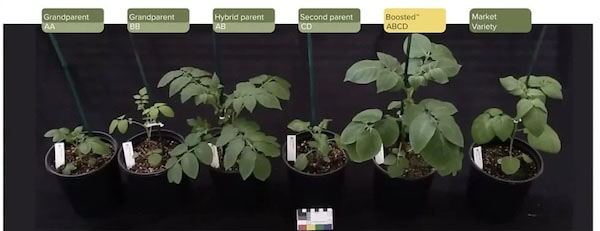The process of breeding new plant varieties is a long and arduous process, even with newer gene-editing technology like CRISPR. As Ohalo CEO Dave Friedberg explains, the main problem is that when plants are crossbred, only around half of the genes from each parent are transferred to their offspring. Additionally, the genes that each plant transfers are random, which makes cross-breeding is a bit of a crapshoot. The company’s “boosted breeding” technology solves this by enabling two parents to pass on their entire genome to the next generation, delivering outcomes not possible with traditional breeding methods.
Friedberg says boosted breeding is essentially a brand new technology in agriculture. “We had this theory that we could change how plants reproduce. If we could do that, then all the genes from the mother and all the genes from the father would combine in the offspring,” Friedberg explained on a recent “All-In” podcast.
By applying specific proteins to the parent plants, Ohalo’s technology switches off the natural reproductive circuits that cause plants to split their genes. Consequently, the offspring receive all the beneficial DNA from both parent plants, resulting in plants with two complete sets of chromosomes, aka “polyploid” plants. Friedberg says that using traditional methods, “it may never happen that you get all the good genes together in one plant to make it both disease resistant and drought resistant, for example.”
While polyploidy does occur naturally in nature, it is not always predictable. “There is a whole bunch of plant species that are polyploid with multiple sets of chromosomes,” notes Friedberg. “Sometimes in evolution plants go through spontaneous polyploidy. Somehow the genes double or they end up inheriting both sets of chromosomes. What we’re effectively doing is controlling polyploidy.”
According to Ohalo’s website, boosted breeding unlocks the ability to combine traits into Boosted plants that might otherwise take thousands of years, or be impossible, to combine using traditional methods. It also makes way for crops that are larger and more resilient than either of their parents due to trait combinations and radically improved genetic diversity, with overall yield gains of up to 50-100%+. Additionally, boosted breeding can deliver genetically uniform true seeds that revolutionize agronomic practices in many clonally propagated crops, helping to increase efficiency, reduce cost, and minimize disease and yield loss.
In one of the experiments Friedberg shared, Ohalo scientists used two parent potato plants (labeled as A and CD below). Both had relatively modest yields when grown individually, producing 33 grams and 29 grams of potatoes respectively. However, by applying Ohalo’s boosted breeding technology, they created an offspring potato plant, referred to as ABCD, which showcased an astonishing yield of 682 grams. This result translates to more than a 20-fold increase in yield compared to its parents. These boosted potatoes were not only larger but also healthier
Ohalo has slowly been coming out of stealth mode the last few months as it has announced new gene editing patents. Friedberg himself is an agtech veteran that some may recognize from his first startup, The Climate Corporation, which he sold to Monsanto for $1.1 billion in 2013. Friedberg also co-hosts the All-In podcast where he unveiled Ohalo’s boosted breeding tech. He co-founded Ohalo in 2019 with the company’s CTO Jud Ward, who spent seven years conducting breeding work at Driscoll’s.
Friedberg says Ohalo’s boosted breeding technology has worked in every plant they’ve tried it on. He stresses the incredible yield gains in potatoes. Some of the data we have is ridiculous. The yield on some of these plants goes up by 60% to 100% or more.” When asked if there were any downsides, Friedberg claims there is none. “The only risk is that once you get beyond a certain limit of polyploidy, and it varies from species to species, you actually start to see yield declines. But for what we’re talking about, as far as we’ve seen, it’s universally beneficial.”
Apparently, a lot of breeders that Friedberg has met with don’t believe what Ohalo claims to have accomplished. “There is definitely a holy shit moment when you speak with breeders about this.” He says it will probably take a while to explain the technology and show that it’s real. “So that’s what we’re going through now… getting people to really understand it.”
Watch the All-In podcast HERE. Friedberg talks about Ohalo about 40 minutes in. Visit Ohalo’s website HERE. (Sources: Agtecher, AgFunder, All-In)







